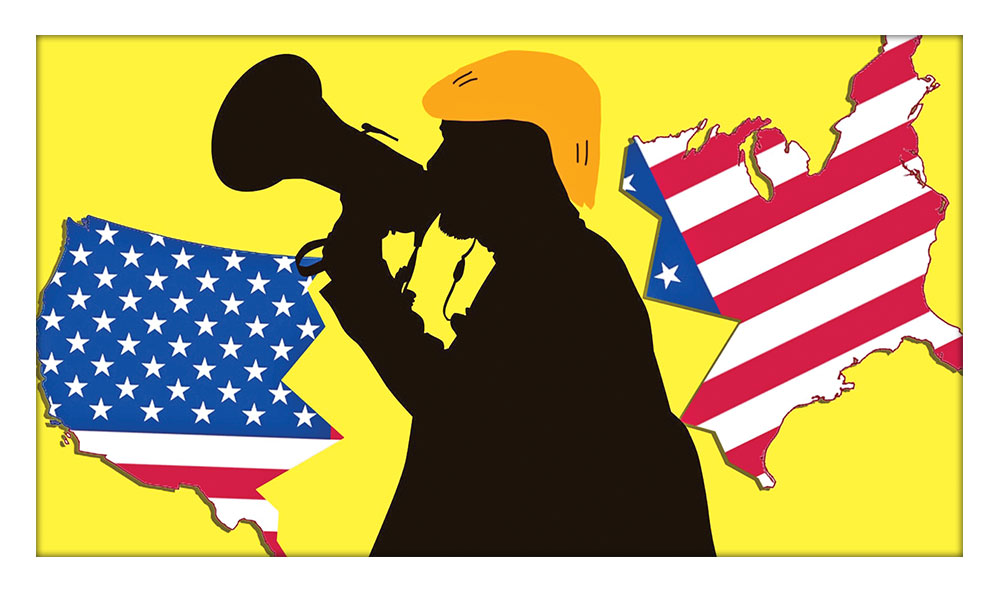MUSLIMS ENTER AMERICAN POLITICS
- 10 Nov - 16 Nov, 2018

As my recent three-week working trip to Rwanda and South Africa was winding down, my father wrote from America to ask after my wellbeing. I told him how much I was enjoying Africa, and added: “Another thing that’s been great about this trip is being relatively away from all the American crap.”
“Good,” he replied. “I’m afraid, however, that the crap will still be here when you get home.”
Rwanda and South Africa are both damaged societies facing serious problems, and far be it from me to offer any assessment on how well either country is addressing them. But at least those countries know, more or less, what their problems are. That can’t be said about America, because America has forgotten how to communicate properly with itself. Americans complain nonstop to themselves and each other about “the media,” and to do that they use… the media. It often seems that the media are the only thing holding such a vast and various continent-sized country together. And you might have noticed that it’s not really holding together anymore.
In a blog entry posted just before Congress pitifully failed to avert a shutdown of the federal government, the incisive writer James Howard Kunstler described his experience watching the tediously partisan coverage on the cable television channels CNN, Fox News, and MSNBC: “With each click of the remote control I felt like I was arriving and departing different planets.” That’s how it is anymore in America, with Americans of different leanings “making our own reality,” as the right-wing kingmaker Karl Rove notoriously (and unapologetically) put it years ago. But it goes beyond that.
As long ago as 1994, the British novelist J.G. Ballard wrote of “the imaginary America created by Hollywood and the media landscape,” where “the sidewalks and filling stations and office blocks seem to imitate the images of themselves in countless movies and TV commercials” and “the American people one meets in hotel lobbies and department stores seem like actors in a huge televised sit-com.” This is what national life amounts to, in a country where most people are usually either watching television or tweeting.
Crossing an ocean and spending a few weeks paying attention to other countries, offline and at ground level, allows an American like me to see America from the outside, for the utterly unserious and narcissistic society that it is, wallowing in a kind of intellectual and moral pollution that thoroughly permeates its public life. Not all Americans have the means, opportunity or inclination to travel as I’ve done, but I cherish the chance, so that when I return I might retain a vestigial memory of what real life on Planet Earth is really like, to aid me in making some sense of everything following reentry into the pervasive American mediascape.
An attentive reader will have noticed that I’ve written fully half of a 1000-word “Letter from America” column without mentioning Trump. That’s because Trump, damaging and disgusting as he is, is not America’s real problem. Our real problem is our addiction to our own media. The best publication covering America these days is the British newspaper The Guardian, but even it feeds the problem by routinely endowing Hollywood and other purveyors of popular culture with undue gravitas. In The Guardian and even in the stately New York Times, the latest stand-up routines of late-night comedians and skits from the tired show Saturday Night Live are parsed and analyzed as if they constituted serious comment on current events.
I understand the impulse to mock and laugh, but the real truth is that Trump himself is so ridiculous and shameless that he can’t be satirized, and there’s nothing really funny about what’s happening to America. And we choose not to remember that the same hosts and shows actually consorted with Trump before and during the 2016 campaign. Saturday Night Live actually had him on the show as a guest host, more than once. Ironically – given his own complicity in all this – the comedian Trevor Noah, host of The Daily Show, has come to the correct conclusion: “Sometimes Trump is so stupid that it’s not even funny.”
The Guardian’s review of Michael Wolff’s explosive book Fire and Fury: Inside the Trump White House ended with the excellent point that “we are likelier to drown in Trump’s drivel than to burn up in a nuclear blitz” and “our stunned fascination sustains him: he has become our guilty pleasure.” This is uncomfortably on the mark. Trump won the election because he manipulated the media. But, even more to the point, he won because he knew that he could enlist the media in his sick project of manipulating the basest urges of the American public. He knew that the media – especially, and now notoriously, social media – were where Americans could be reached and their buttons pushed.
So what’s the solution? It’s not my job to prescribe solutions, but I will suggest an obvious first step: Americans should turn off their televisions and disable their Twitter accounts. James Howard Kunstler reiterated one of his own insistent themes by reminding us, apropos the government shutdown, that “everything organized at the gigantic scale is going to wobble and fail. It’s nature’s way of saying, ‘get smaller, get realer, scale down, and get local.’” So the next step, after going offline, is to go outdoors. Make yourself useful in one way or another, in the real world, close to home.
And, counterintuitive as this might sound, Americans would benefit from imagining the possibility that, just maybe, the disaster we’re living through might not be so disastrous after all. Like a lot of things, it depends on the attitude one brings to it. So the federal government just shut down? So what? There’s a real world outside the front door of every American, and it’s high time we reacquainted ourselves with it. •
COMMENTS